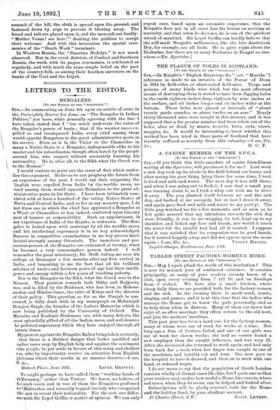LETTERS TO THE EDITOR.
BENGALEES.
[To THE EDITOR OF THE "SPECTATOR."] SIR,—In commenting on June 4th upon an article of mine in the Fortnightly Review for June, on The Bengalee in Indian Politics," you have, while generally agreeing with the line I have taken, stated that I "too much underrate the value of the Beng,alee's power of brain; that if the warrior races ex- pelled us and reconquered India, every chief among them would appoint Bengalees to the great administrative posts in his service. Even as it is, the Vizier or the Chancellor in many a Native State is a Bengalee, indispensable alike to his master and his subordinates, though often hated by the people around him, who suspect without accurately knowing his nationality. He is, after all, to the Sikh what the Greek was to the Roman."
I would venture to point out the error of fact which under- lies this argument. So far as we can prophesy the future from an experience of the past, I would say that, supposing the 1`nglish were expelled from India by the warlike races, no (hid among them would appoint Bengalees to the great ad- nif.nistrative posts in his State. I have been intimately asso- ciated with at least a hundred of the ruling Native States of Nortm. and Central India, and so far as my memory goes, I do not know one in which the chief has appointed a Bengalee as a Wazir or Chancellor, or has, indeed, conferred upon him any post of honour or responsibility. Such an appointment, in my experience of India of the Rajahs, is unknown. The Ben- galee is looked upon with contempt by all the warlike races, and his intellectual supremacy is in no way acknowledged. Success in competitive examinations in no way proves intel- lectual strength among Orientals. The immature and pre- cocious powers of the Bengalee are exhausted at twenty, when be becomes a very commonplace person indeed. I well remember the great missionary, Dr. Duff, taking me over his college at Serampur a few months after my first arrival in India, and lamenting to me the fact that all his brilliant scholars of twelve and fourteen years of age lost their intelli- gence and energy within a few years of reaching puberty.
Nor is the Bengalee to the Sikh, what the Greek was to the Roman. That position towards both Sikhs and Rajpoots, was, and is, filled by the Brahman, who has been, in Mahom- medan and Hindoo times, the ruler of Kings and the director of their policy. This question, so far as the Punjab is con- cerned, is fully dealt with in my monograph on Maharajah Run jeet Singh, the founder of the Lahore Monarchy, which is now being published by the University of Oxford. The Maratha and Kashmir Brahmans are, with many defects, the most splendidly gifted of all the Indian races, and well deserve he political supremacy which they have enjoyed through all istoric times.
My protest against the Bengalee Baboo being taken seriously, that there is a distinct danger that better qualified and
anlier races may, by English help and against the sentiment (the people, be put aside in favour of this noisy and shallow css, who by importunity receive an attention from English piticians which their merits in no manner deserve.—I am,
&c., Ve ought perhaps to have called them "working heads of thTreasury," rather than Viziers. We know, we believe, of for such cases, and in two of them the Bengalees professed tolMahrattas, and earnestly begged the lady who recognised thern not to reveal their nationality. For the rest, our differ. encWith Sir,Lepel Griffin is matter of opinion. We can only repeat ours, based upon an extensive experience, that the Bengalee does not in all cases lose his brains on arriving at maturity, and that when he does not, he is one of the quickest witted of mankind. Sir Lepel Griffin can hardly believe that the self-made Bengalee millionaires, like the late Aushotosh Dey, for example, are all fools. He is quite right about. the Brahmins, but there are as many Brahmins in Bengal as else- where —En. Spectator.]






































 Previous page
Previous page